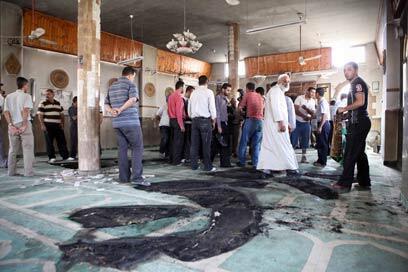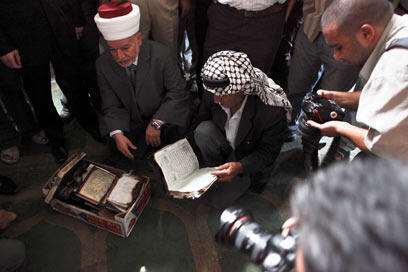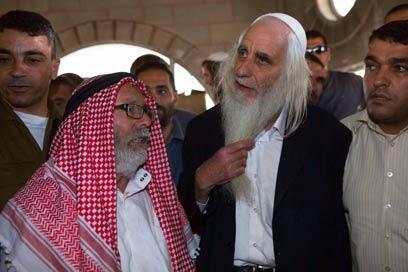The US on Tuesday strongly condemned the torching of the mosque in the West Bank village of Beit Fajar, near Bethlehem. State Department Spokesperson Philip Crowley also called for the perpetrators to be brought to justice.
Residents are trying to return to their regular lives after the arson, but will not forget the destruction. The mosque's imam, Ali Taqatqa, tried to clear up the place a little for VIP visits but did not entirely erase the evidence.
"I am leaving it as it was after the fire on purpose, so that people will see what those settlers did, so that the media and history will be witness to the crime that was committed here yesterday (Monday)," he said.
Taqatqa also said he intends to preserve the carpet fragments and the partly-burned Koran, and put them in a display case in the mosque. He said when it was built in the 80s, just before the Intifada ,there were attempts to destroy it.
"However, we managed to maintain the prayer room, and when the (Palestinian Authority) took over, we expanded it into a worthy mosque," he said. Taqatqa is certain that whoever is responsible for the arson wanted to remold the conflict along religious lines, though he hopes it will not come to that, because "that will be much worse."
'History will be witness to the crime' (Photo: Noam Moskowitz)
Taqatqa called on the IDF to show the footage from cameras which "film every ant that goes in and out of the village."
"How is it that they can't find the perpetrators?" he said. "I can imagine if a Palestinian from the village had torched a synagogue, they would have burned down the whole village already. But they know it's our weak point, that we don't harm religious sites, because we believe in holy places and in the prophets, and we wouldn't dare to harm them."
'Prayer – best response to settlers'
The torched mosque is one of six in Beit Fajar, near the Jewish settlements of Gush Etzion. The village, which has some 12,000 residents, earns a living mainly from the 300 stone factories in the area which supply to Israel and the West Bank. Most of the village's workers are employed at these factories, and just 1% finds work in Israel.
Following the torching, the village declared a general strike, broken only by the store near the mosque which, it seems, didn't want to miss the trade from those visiting the site. At 8:00 am, school children marched in protest towards the junction separating the village from Gush Etzion.
Carpet fragments and Koran to be displayed (Photo: Noam Moskowitz)
"We carried Palestinian flags, shouted 'Allahu akbar' and promised the settlers we're not afraid of them," said Muhammad Jalal, in 9th grade, who was one of the first to arrive at the scene of the burning mosque. "I put out flames with my hands. Don't look at me smiling, I'm angry, I pray in the mosque and when I saw it going up in flames I started crying," he said, while his hands still bore the signs of burns.
The kids around him whisper in excitement – finally something is happening in the village. And indeed, the village has become a pilgrimage site for politicians, public figures and, mostly, the press.
Rabbis from the nearby settlements wanted to visit already on Monday, but their visit was postponed to Tuesday. The PA mufti also came and led the residents in prayer. "After the torching, even those who don't pray began coming to the mosque," Taqatqa said. "Inshallah, they'll become regulars. That would be the best response to the settlers."
'Offer help even from Jordan'
Palestinian Prime Minister Salam Fayyad was expected to visit. Earlier he had called to say the PA would carry out comprehensive restoration work on the mosque, though the imam said with so much anger it would be enough to make one turn around the village to collect sufficient donations for renovation.
"Even from Jordan they've called to offer assistance," he said. "The mosque is important to people. I would rather lose my son instead of the mosque being burnt down."
Rabbis visit the mosque Tuesday (Photo: Noam Moskowitz)
Taqatqa adds that people are still nervous. "The situation is volatile, it hasn't gone back to how it was," he said. "This was the first time the settlers attack this village and its mosque. Until now there was no friction between us. Whoever did this, he can't be religious or believe in any religion, because a true believer wouldn’t have burned a house of God."
A family member, Muhammad, added the settlers burned the Koran but they can't burn what is in the heart, because the Koran is in the heart of every Muslim.
Arafat Sawata, some 60 years old, claimed the burning of mosques signifies the end of the Israelis.
"When it comes to this, even America and the entire world can't help the Israelis," he said. "I remember what (former Prime Minister Yitzhak) Rabin said after the massacre at the Cave of the Patriarchs: 'That's it, we're finished,' and Rabin knew what he was talking about."
News agencies contributed to this report.




